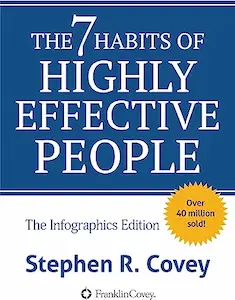The 7 Habits of Highly Effective People - Summary
Stephen R. Covey

Introduction
“The 7 Habits of Highly Effective People” is a self-help book written by Stephen R. Covey. It was first published in 1989 and has since sold over 25 million copies worldwide. The book is based on Covey’s belief that there are seven habits that highly effective people possess, and that by adopting these habits, anyone can become more successful in their personal and professional lives.
Habit 1: Be Proactive
The first habit that Covey discusses is being proactive. He argues that highly effective people take responsibility for their own lives and do not blame others for their problems. They focus on what they can control and take action to improve their situation. Covey uses the example of Viktor Frankl, a Holocaust survivor who was able to find meaning in his suffering by choosing to focus on his inner thoughts and feelings rather than his external circumstances.
Habit 2: Begin with the End in Mind
The second habit is to begin with the end in mind. Covey suggests that highly effective people have a clear vision of what they want to achieve in life and set goals accordingly. He uses the example of a business owner who creates a mission statement for their company to guide their decision-making and ensure that they are working towards their ultimate goal.
Habit 3: Put First Things First
The third habit is to put first things first. Covey argues that highly effective people prioritize their time and focus on the most important tasks first. He uses the analogy of filling a jar with rocks, pebbles, and sand to illustrate the importance of putting the big things first and then filling in the smaller details.
Habit 4: Think Win-Win
The fourth habit is to think win-win. Covey believes that highly effective people seek mutual benefit in all of their interactions and do not see life as a zero-sum game. He uses the example of a business negotiation where both parties can benefit from a fair deal rather than one person winning at the expense of the other.
Habit 5: Seek First to Understand, Then to Be Understood
The fifth habit is to seek first to understand, then to be understood. Covey argues that highly effective people listen to others with empathy and seek to understand their perspective before sharing their own. He uses the example of a marriage counselor who helps a couple to communicate more effectively by teaching them to listen to each other’s needs and concerns.
Habit 6: Synergize
The sixth habit is to synergize. Covey suggests that highly effective people work collaboratively with others to achieve more than they could on their own. He uses the example of a sports team where each member has a unique role to play, but together they can achieve a common goal.
Habit 7: Sharpen the Saw
The seventh habit is to sharpen the saw. Covey believes that highly effective people take care of themselves physically, mentally, emotionally, and spiritually. They recognize that they cannot be productive if they are not taking care of themselves first. He uses the example of a woodcutter who takes breaks to sharpen their saw so that they can work more efficiently.
Conclusion
In conclusion, “The 7 Habits of Highly Effective People” is a timeless self-help book that provides practical advice for anyone looking to improve their personal and professional lives. Covey’s seven habits are easy to understand and apply, and he provides numerous examples and anecdotes to illustrate his points. By adopting these habits, anyone can become more proactive, goal-oriented, and collaborative, and ultimately achieve greater success in all areas of their life.